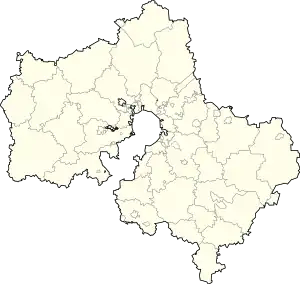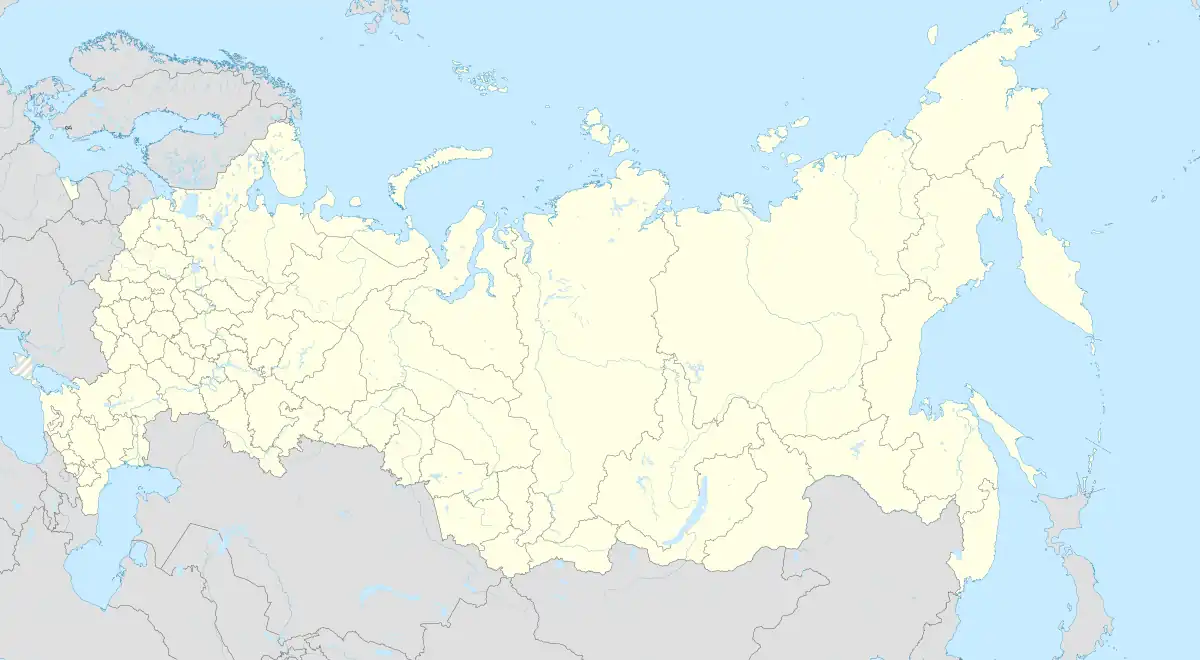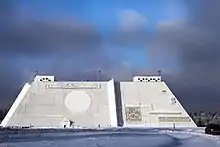A-135 anti-ballistic missile system
The A-135 (renamed to A-235)[5] (NATO: ABM-4 Gorgon) is a Russian anti-ballistic missile system deployed around Moscow to intercept incoming warheads targeting the city or its surrounding areas. The system was designed in the Soviet Union and entered service in 1995. It is a successor to the previous A-35, and complies with the 1972 Anti-Ballistic Missile Treaty.[2]
| 51T6 (ABM-4 Gorgon) | |
|---|---|
 DIA drawing of an SH-08/ABM-3A GAZELLE 53T6 missile launching with Don-2 phased array radar in background | |
| Type | Anti-ballistic missile |
| Place of origin | Soviet Union |
| Service history | |
| In service | 1995–present |
| Used by | Russia |
| Production history | |
| Designer | NPO Novator Design Bureau |
| Designed | 1978 |
| Produced | 1988 |
| No. built | 68 |
| Specifications | |
| Mass | 33,000–45,000 kg (73,000–100,000 lb) |
| Length | 19.8 m[1] |
| Diameter | 2.57 m[1][2] |
| Blast yield | 10 kilotonnes of TNT (42 TJ) |
| Engine | 2-stage, solid-fuel |
Operational range | 350–900 km[2] |
| Flight ceiling | 350–900 km |
| Maximum speed | Mach 7 (8,600 km/h; 5,300 mph; 2.4 km/s) |
Launch platform | silo, launcher(?)[2][3] |

The system is operated by the 9th Division of Anti-Missile Defence, part of the Air Defence and Missile Defence Command of the Russian Aerospace Defence Forces.[6][7]
History
A memo from the archives of Vitalii Leonidovich Kataev, written around 1985, had envisaged that the system "will be completed in 1987 to provide protection from a strike of 1–2 modern and prospective ICBMs and up to 35 Pershing 2-type intermediate-range missiles".[8]
The A-135 system attained "alert" (operational) status on February 17, 1995. It is operational although its 51T6 component was deactivated in February 2007. A newer missile (PRS-1M) is expected to replace it. There is an operational test version of the system at the Sary Shagan test site in Kazakhstan.
Structure

A-135 consists of the Don-2N battle management radar and two types of ABM missiles. It gets its data from the wider Russian early-warning radar network, that are sent to the command centre which then forwards tracking data to the Don-2N radar.[4] The Don-2N radar is a large battle-management phased array radar with 360° coverage.[11][12] Tests were undertaken at the prototype Don-2NP in Sary Shagan in 2007 to upgrade its software.[12][13]
Russian early-warning radar network consists of:[14]
- Daryal bistatic active phased array early-warning radars
- Dnepr/Dnestr space surveillance early-warning radars
- Voronezh phased array early-warning radars
- US-KMO, US-K and EKS early-warning satellites
- Command, control, communications and intelligence services
Deployment
There are at least 68 active launchers of short-range 53T6 endoatmospheric interceptor nuclear armed missiles, 12 or 16 missiles each, deployed at five launch sites. These are tested roughly annually at the Sary Shagan test site.[15] In addition, 16 retired launchers of long-range 51T6 exoatmospheric interceptor nuclear armed missiles, 8 missiles each, are located at two launch sites.[4]
| Location[14] | Coordinates [4] | Number [4][14] | Details |
|---|---|---|---|
| Active | |||
| Sofrino | 56°10′51.97″N 37°47′16.81″E | 12 | Co-located with the Don-2N radar |
| Lytkarino | 55°34′39.04″N 37°46′17.67″E | 16 | |
| Korolev | 55°52′41.09″N 37°53′36.50″E | 12 | |
| Skhodnya | 55°54′04.11″N 37°18′28.30″E | 16 | |
| Vnukovo | 55°37′32.45″N 37°23′22.41″E | 12 | |
| Retired | |||
| Sergiyev Posad-15 | 56°14′33.01″N 38°34′27.29″E | 8 | Site was also used in the A-35 system |
| Naro-Fominsk-10 | 55°21′01.16″N 36°28′59.60″E | 8 | Site was also used in the A-35 system |
Successor
The successor system, dubbed 'Samolet-M' (and more recently A-235) will employ a new, conventional, variant of the 53T6 missile to be deployed in the former 51T6 silos.[16][17][18] The new PRS-1M is a modernized variant of the PRS-1 (53T6) and can use nuclear or conventional warheads. It can hit targets at ranges of 350 km and altitudes of 50 km.[19]
Gallery
 ABM missile silo under snow, transporter for 53Т6 missile in background
ABM missile silo under snow, transporter for 53Т6 missile in background Transporter for 51Т6 missile
Transporter for 51Т6 missile Don-2N anti-ballistic missile radar
Don-2N anti-ballistic missile radar
See also
References
- "51T6". www.astronautix.com. Archived from the original on 2015-09-16. Retrieved 2015-11-10.
- "Система А-135 ракета 51Т6 – ABM-4 GORGON". militaryrussia.ru. Archived from the original on 2015-11-27. Retrieved 2015-11-10.
- Sean, O'Connor (12 December 2009). "Russian/Soviet Anti-Ballistic Missile Systems": 1. Archived from the original on 21 November 2015. Retrieved 10 November 2015.
{{cite journal}}: Cite journal requires|journal=(help) - O'Connor, Sean (2012). "Russian/Soviet Anti-Ballistic Missile Systems". Air Power Australia. p. 1. Archived from the original on 2016-09-23. Retrieved 2012-04-30.
- ARBATOV, ALEXEY; DVORKIN, VLADIMIR; TOPYCHKANOV, PETR; ZHAO, TONG; BIN, LI (2017). "ENTANGLEMENT AS A NEW SECURITY THREAT: A RUSSIAN PERSPECTIVE". Entanglement: 11–46.
- "Air space defence troops". BE: Warfare. Archived from the original on 31 March 2017. Retrieved 17 June 2012.
- Stukalin, Alexander (May 2012). "Russian Air and Space Defense Troops: Gaping Holes". Moscow Defense Brief. Centre for Analysis of Strategies and Technologies (2). Archived from the original on 2012-07-04. Retrieved 2012-06-17.
- Podvig, Pavel (23 October 2012). "Very modest expectations: Performance of Moscow missile defense". Russian Strategic Nuclear Forces. Archived from the original on 26 May 2013. Retrieved 10 June 2013.
- "Эксперты рассказали о возможностях новой российской ракеты ПРО". 24 November 2017. Archived from the original on 24 November 2017. Retrieved 24 November 2017.
- "Обнародовано видео испытаний новой российской противоракеты". 24 November 2017. Archived from the original on 1 December 2017. Retrieved 24 November 2017.
- "Don-2NP Pill Box". Global Security. Archived from the original on 2007-06-13. Retrieved 2007-06-12.
- Podvig, Pavel (2007-12-29). "Russia is modernizing the Don-2N radar". Russian Strategic Nuclear Forces. Archived from the original on 2012-03-08. Retrieved 2012-02-01.
- Bukharin, Oleg; Kadyshev, Timur; Miasnikov, Eugene; Podvig, Pavel; Sutyagin, Igor; Tarashenko, Maxim; Zhelezov, Boris (2001). Podvig, Pavel (ed.). Russian Strategic Nuclear Forces. Cambridge, MA: MIT Press. ISBN 0-262-16202-4.
- Podvig, Pavel (2012-01-30). "Early Warning". Russian Strategic Nuclear Forces. Archived from the original on 12 January 2013. Retrieved 24 March 2012.
- Podvig, Pavel (2011-12-20). "Test of a missile defense interceptor". Russian Strategic Nuclear Forces. Archived from the original on 2012-02-14. Retrieved 2012-04-30.
- Honkova, Jana (April 2013). "Current Developments in Russia's Ballistic Missile Defense" (PDF). George C. Marshall Institute. Archived from the original (PDF) on 2014-04-26. Retrieved 9 June 2013.
- "A-235 Samolet-M". George C. Marshall Institute. n.d. Archived from the original on 1 June 2013. Retrieved 9 June 2013.
- Russia Revamps Missile Defenses Around Moscow Archived 2014-07-24 at the Wayback Machine MOSCOW, September 17, 2012 (RIA Novosti)
- @DFRLab (1 December 2017). "#PutinAtWar: New Russian Anti-Ballistic Missile". Archived from the original on 5 March 2018. Retrieved 5 March 2018.
External links
- "Test launch", Function (video) (in Russian), RU, 2011
{{citation}}: CS1 maint: location missing publisher (link). - "DON-2N photos", Military legacy of the USSR, English Russia, 2012-12-29.